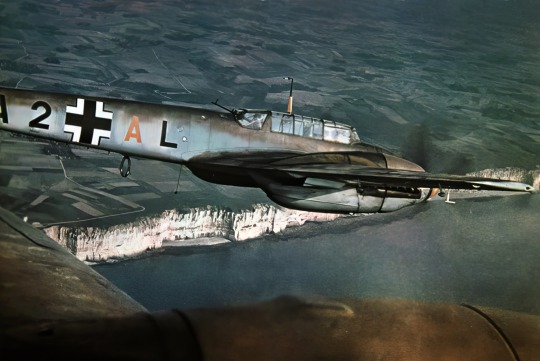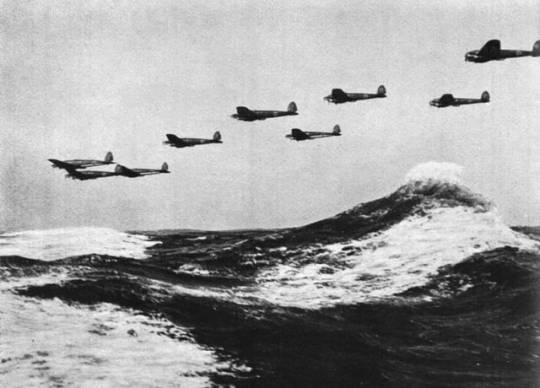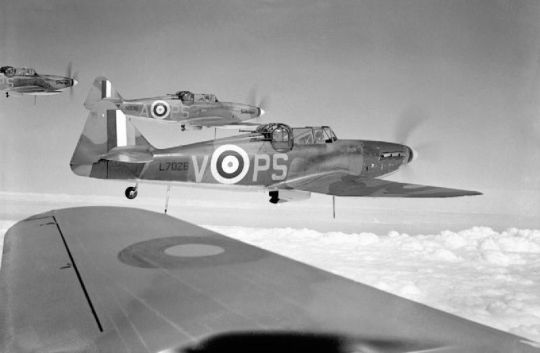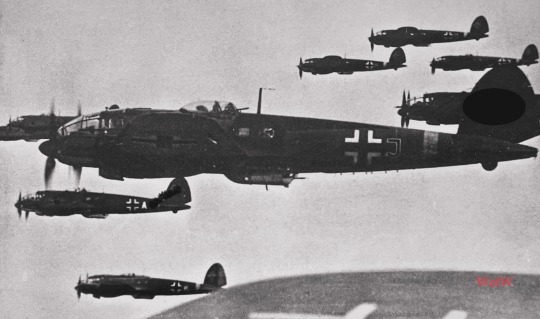#Battle of Britain 1940
Explore tagged Tumblr posts
Text
Spitfire girls, 1940. 🙌
Unsung young heroines of the Battle of Britain who helped build the iconic RAF Spitfire.
—
The Battle of Britain was a military campaign of the Second World War in which the Royal Air Force (RAF) and the Fleet Air Arm (FAA) of the Royal Navy defended the United Kingdom (UK) against large-scale attacks by Nazi Germany's Air Force, the Luftwaffe.
It was the first major military campaign fought entirely by air forces.
The British officially recognize the battle's duration as being from 10 July until 31 October 1940, which overlaps the period of large-scale night attacks, known as the Blitz, that lasted from 7 September 1940 to 11 May 1941.
#Battle of Britain#RAF Spitfire#Spitfire#young heroines#war heroes#World War II#Battle of Britain 1940#Royal Air Force (RAF)#Fleet Air Arm (FAA)#Royal Navy#Luftwaffe#Blitz
6 notes
·
View notes
Text

A Spitfire turns away in retreat after taking a hit from a German Heinkel somewhere over the English Channel - 1940
#world war two#ww2#worldwar2photos#history#1940s#ww2 history#wwii#world war 2#ww2history#wwii era#english channel#the battle of britain#1940#heinkel#supermarine spitfire#spitfire#raf#royal air force
237 notes
·
View notes
Text

Messerschmitt Bf 110 (3C+GR), Battle of Britain, 1940. For more, see my Facebook group - Eagles Of The Reich
90 notes
·
View notes
Text

Messerschmitt Bf 110C (A2+AL) of 6./ZG 2 over the south coast of Britain, 1940 ➤➤ Unusual German Aircraft: https://youtu.be/fCgmIL0w2Qs
#wwii germany#youtube#aircraft#messerschmitt#bf 110#luftwaffe#battle of britain#britain#Britain WW2#1940s#documentary#military#dronescapes#aviation#aviation history#history#aircraft documentary#airplane#ww2#wwii#documentation
115 notes
·
View notes
Text

A favourite shot on 15 Sep - a tribute to 'The Few': 92 Sqn's Brian Kingcome with his teenage protege. In First Light Geoffrey Wellum describes him as 'always cool and quietly spoken, promoting trust [with] a good R/T voice, which exudes confidence...a fine experienced leader'. #TheFew #BattleofBritainSunday blackrobertson.com
@Blackrauthor via X
Tap title bar to read☝️
15 notes
·
View notes
Text

A lovely photo but most likely posed for propaganda purposes. This wasn’t a public library but one in Holland House, the private home of Giles Holland Fox-Strangways, 6th Earl of Ilchester. It was hit by 22 incendiary bombs during a 10-hour raid on September 27, 1940. This photo was taken shortly after the raid.
10 notes
·
View notes
Text

Le pilote de chasse tchécoslovaque Josef František du 303 Squadron RAF posant devant son Hurricane – Bataille d'Angleterre – Septembre 1940
Josef František est un pilote tchécoslovaque qui a combattu dans les armées de l'air polonaises, françaises et anglaises. Il est le pilote non anglais de la RAF ayant obtenu le plus grand nombre de victoires pendant la bataille d'Angleterre (17 victoires en septembre) avant de se crasher le 8 octobre 1940.
#WWII#bataille d'angleterre#battle of britain#royal air force#raf#303 squadron raf#les femmes et les hommes de la guerre#women and men of war#josef frantisek#angleterre#england#09/1940#1940
8 notes
·
View notes
Text

"THE SOUND OF DISTANT AIRCRAFT GROWS LOUDER AND LOUDER...!"
PIC(S) INFO: Spotlight on a reportedly composite photograph of German Heinkel He 111 bombers over the English Channel, flying low in order to avoid all possible British radar frequencies, c. 1940.
[Who caught my 1981 DISCHARGE reference? War is a black hole to avoid!]
Source: www.reddit.com/r/WWIIplanes/comments/111q7fb.
#German Heinkel He 111 bombers#WWII#War photography#Luftwaffe Bombers#German Luftwaffe#Bomber Squadron#Battle of Britain#Luftwaffe#1940s#English Channel#Military history#German Bombers#1940#Bombers#Heinkel He 111 bombers#World War 2#War history#Composite photography#Forties#40s#Battle of Britain 1940#World War II#Heinkel Bombers#Nazi Germany#Photography#Aviation
25 notes
·
View notes
Text

Blood for Britain: Dr. John Scudder and Nurse Mary Sargent in a dust-proof hospital room, August 15, 1940, drawing plasma from blood. New Yorkers began donating their blood in the Red Cross effort to furnish thousands of liters of plasma saline solution for the treatment of Britons wounded in the war.
Photo: Associated Press
#vintage New York#1940s#World War II#blood donation#giving blood#August 15#15 August#15 Aug.#Aug. 15#hospital#Battle of Britain
33 notes
·
View notes
Text
Remember the Battle of Britain: July–October 1940.

By late 1940, Britain faced the threat of a German invasion, but the incursion would succeed only with air superiority. What followed was the first major campaign fought by opposing air forces.
For four months, the German Luftwaffe carried out attacks on British airfields, radar stations, and aircraft factories, and bombed British cities, too. But the Stukas proved too vulnerable to being intercepted, and the Germans couldn’t mass enough planes to defeat the fighter pilots of the Royal Air Force in their Hurricanes and Spitfires. Heavy casualties forced the Luftwaffe to scale down operations. Hitler’s invasion plans were put on hold indefinitely.
[Must Read: What if the Nazis Bombed Britain Earlier?]
#year 1940#German invasion#British cities#Royal Air Force#casualties#british forces#Battle of Britain#incursion
2 notes
·
View notes
Text
A Legacy of Strength: Churchill’s Historic June 4th, 1940 Speech
youtube
In the annals of history, there are speeches that resonate far beyond their immediate context, echoing through the corridors of time with unwavering clarity. One such speech is Winston Churchill's address to the British House of Commons on 4th June 1940. Delivered during the dark days of World War II, it is a masterclass in rhetoric and resolve, encapsulated by the stirring words, "We shall not flag nor fail. We shall go on to the end. We shall defend our Island, whatever the cost may be."
This speech was not just a call to arms; it was a galvanizing force that unified a nation under siege. Let's explore some key features of this historic oration that continue to captivate and inspire.
1: A Rallying Cry
Purposeful Tone: Churchill's speech was crafted to bolster British morale during a time of great uncertainty. His deliberate choice of words and assertive tone aimed to reassure the public and military forces alike, affirming that surrender was not an option.
Emotional Resonance: The speech tapped into the collective spirit of the British people, acknowledging their fears while simultaneously igniting a fierce determination to stand strong against the looming threat of Nazi Germany.
2: Masterful Use of Repetition
Repetition for Emphasis: The repeated use of "We shall" throughout the speech is a rhetorical device that underscores the resolve and solidarity of the British people. This technique not only emphasizes commitment but also creates a rhythmic, almost musical quality that reinforces the speech's memorability.
Building Momentum: As the speech progresses, the repetition builds momentum, sweeping the audience along on a wave of national pride and unyielding strength.
3: A Vision of Collective Unity
Inclusive Language: By using inclusive language such as "our Island" and "we," Churchill fostered a sense of unity and shared responsibility. This was crucial in rallying a diverse population to a common cause.
Beyond Borders: Churchill's words extended beyond the geographical confines of Britain, symbolizing the broader fight for freedom and democracy. This vision resonated with Allied nations, cementing partnerships that were vital for the war effort.
4: Timeless Inspiration
A Legacy of Resilience: Decades later, Churchill's speech remains a symbol of resilience and courage. It serves as a reminder that in times of adversity, the human spirit is capable of remarkable perseverance.
Modern Relevance: In today's world, where challenges abound, the speech continues to inspire leaders and individuals alike to stand their ground and face difficulties head-on.
In conclusion, Winston Churchill's speech of 4th June 1940 is more than a historical artifact; it is a testament to the power of words to unite, inspire, and fortify the human spirit against overwhelming odds. Though not essential to daily life, revisiting this classic oration offers a profound reminder of the enduring strength found in collective resolve and an unwavering commitment to a just cause.
Go to Churchill's Speech on 4th June 1940
#Winston Churchill#4th June 1940#Dunkirk evacuation#World War II speeches#Battle of Britain#British morale#Defiance against Nazi Germany#Repetition in rhetoric#We shall fight on the beaches#British unity#Wartime leadership#Call to arms#Speech of resilience#National pride#House of Commons address#Allied cooperation#Timeless inspiration#Rhetoric of unity#Perseverance and courage#Churchillian legacy#Youtube
1 note
·
View note
Text

German Heinkel He111’s en route to England on another mission - date unknown. This photo shows the glass turrets well armed with the MG 15’s
#world war two#ww2#worldwar2photos#history#1940s#ww2 history#wwii#world war 2#wwii era#ww2history#heinkel#he111#heinkel he111#the battle of britain#england#battle of britain#luftwaffe
248 notes
·
View notes
Text

Excellent artwork from Signal (the Wehrmacht magazine) depicting Junkers Ju 87B Stukas attacking an industrial target during the Battle of Britain, summer, 1940. For more, see my Facebook group - Eagles Of The Reich
#germany#ww2#luftwaffe#ww2 aircraft#junkers#ju 87#stuka#battle of britain#1940#ww2 german aircraft#wehrmacht
24 notes
·
View notes
Text
Lieutenant Omer Lévesque, DFC (U.S.), Air Medal (U.S.): Canadian Pilot Who Flew during World War II and the Korean War
Subscriber Content Add content here that will only be visible to your subscribers. Payment Image: Sergeant Pilot Omer Levesque is assisted into his parachute prior to flying a mission while assigned to No. 401 Squadron, RCAF, on July 7, 1941, during World War II. Omer “Trottle” Lévesque served as a pilot with the Royal Canadian Air Force (RCAF) during the Second World War. He flew many…
#1940s#1950s#Battle of Britain#Battle of France#British Commonwealth Air Training Plan (BCATP)#Canadian Pilot#DFC#F-86 Sabre#History Daily#Korean War#Omer Levesque#Prisoner of War#RCAF#Stalag Luft III#Supermarine Spitfire V#USAAF#World War II
0 notes
Text






























"Duxford Battle of Britain Air Show"_ IWM Duxford, Duxford Cambridgeshire, CB22 4QR _ 15.09.2024 _ Photos by: Spyros Kaprinis.
#Duxford#Battle of Britain#Air Show#Museum#USAF#RAF#Cambridgeshire#England#UK#1940#2024#Spyros Kaprinis
0 notes
Text

Memorial in our local Aldi Car Park.
R.I.P Ginger, World War 2 hero.
#1930s#1940s#1950s#raf#ww2#world war 2#fighter ace#spitfire#hurricane#ace#memorial#history#battle of britain#battle of france#war#aldi#car park#wetherby#yorkshire#leeds
1 note
·
View note